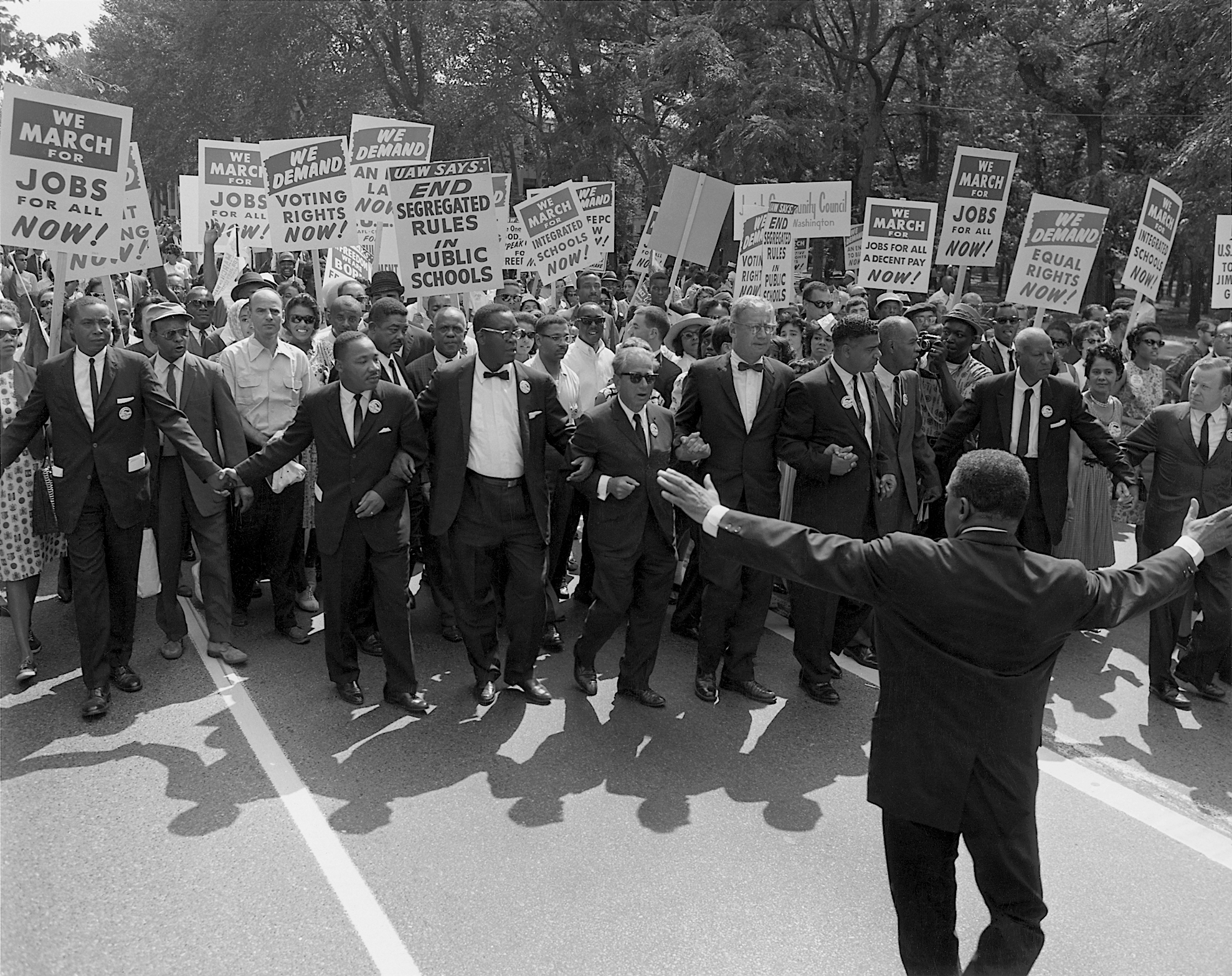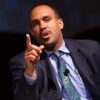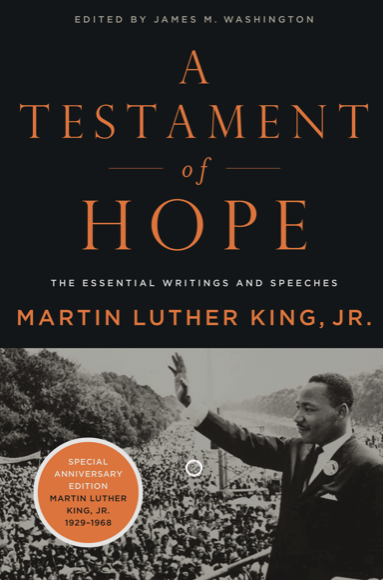Dedrick Asante Muhammad says Martin Luther King Jr. was clear-eyed that America must embrace radical change, which won’t come from the powerful but from the “naïve and unsophisticated.”

Martin Luther King Jr., front row and second from left, at the March on Washington on Aug, 28, 1963. (U.S. National Archives and Records Administration, Wikimedia Commons)
By Dedrick Asante-Muhammad
OtherWords
 2022 has begun with melancholy, as our country sees the pandemic reach new heights. Meanwhile our crises of climate, democracy, and inequality seem more entrenched than ever.
2022 has begun with melancholy, as our country sees the pandemic reach new heights. Meanwhile our crises of climate, democracy, and inequality seem more entrenched than ever.
All this uncertainty is taking a toll, but uncertain times are far from unprecedented. Dr. Martin Luther King, Jr. spoke to an equally uncertain time and found hope in recognizing the necessity of radical change.
As we celebrate the U.S. national holiday dedicated to King, I always encourage people to take some time to look at his writings — and I especially do this year. In moments like these, I like to revisit one of King’s last essays, “A Testament of Hope,” which sounds as relevant today as the day he wrote it.
“Whenever I am asked my opinion of the current state, I am forced to pause,” King wrote. “It is not easy to describe a crisis so profound that it has caused the most powerful nation in the world to stagger in confusion and bewilderment.”
Sound familiar?
 “Today’s problems are so acute because the tragic evasions and defaults of several centuries have accumulated to disaster proportions,” King continued. These interrelated problems, he continued, have “now merged into a social crisis of almost stupefying complexity.”
“Today’s problems are so acute because the tragic evasions and defaults of several centuries have accumulated to disaster proportions,” King continued. These interrelated problems, he continued, have “now merged into a social crisis of almost stupefying complexity.”
King specifically named “war, inflation, urban decay, white backlash, and a climate of violence” alongside “race relations and poverty” as the cascading crises of his day. To that list we could add the pandemic and climate crisis today.
Even more than half a century ago, King believed that the time for small, incremental changes had passed. “The luxury of a leisurely approach to urgent solutions — the ease of gradualism — was forfeited by ignoring the issues for too long,” he wrote.
“When millions of people have been cheated for centuries, restitution is a costly process. Inferior education, poor housing, unemployment, inadequate health care — each will require billions to correct,” King warned. “Justice so long deferred has accumulated interest and its cost for this society will be substantial in financial as well as human terms.”
But for a country weighed down by segregation, inequality and the Vietnam War, King also knew that the costs of injustice were greater — something that feels even more true today.
“If we look honestly at the realities of our national life, it is clear that we are not marching forward,” he wrote. “We are groping and stumbling; we are divided and confused.”
In the face of these “deeply rooted evils” and “systemic rather than superficial flaws,” King offered a remedy: the “radical reconstruction of society itself” — and praised the dissenters who called for it, often at great cost.
“Today’s dissenter tells the complacent majority that the time has come when further evasion of social responsibility in a turbulent world will court disaster and death,” he said. “America has not yet changed because so many think it need not change, but this is the illusion of the damned.”
Although King knew that change wouldn’t be easy, he was actually hopeful about it.
“Humanity has the capacity to do right as well as wrong. The past is strewn with the ruins of the empires of tyranny, and each is a monument not merely to our blunders but to our capacity to overcome them… That’s why I remain an optimist, though I am also a realist, about the barriers before us.”
King’s “Testament of Hope” is based on a realist’s assessment of the need for political, economic, and moral change. King is clear-eyed that America must embrace radical change — which won’t come from the powerful but from the “naïve and unsophisticated.”
Hope in radical change, for many of us, seems out of place during this time of tension. Yet there has been incredible change over the last few years. Rather than return to our dysfunctional past, King’s “Testament of Hope” points to the need to embrace and advance that change.
As we begin 2022, I find this message as important as ever.
FBI letter to MLK telling him to kill himself within 34 days or face sex smear #MLKDay #MLKDay2022 https://t.co/Ku1rKW3Oxf pic.twitter.com/FAoY8tvf96
— WikiLeaks (@wikileaks) January 17, 2022
Dedrick Asante-Muhammad is the chief of Race, Wealth and Community at the National Community Reinvestment Coalition and an associate fellow of the Institute for Policy Studies.
This op-ed was distributed by OtherWords.org.
The views expressed are solely those of the author and may or may not reflect those of Consortium News.

I wonder if MLK’s “naïve and unsophisticated” aren’t Hillary’s “deplorables.” It seems incredible to me that millions who voted for Obama in 2008 and 2012 turned into hardcore racists in 2016 and 2020. Could it be that the Democrats’ failure to live up to their promises had something to do with voters’ disgust? Biden’s and Pelosi’s current little dog-and-pony show about their noble intentions thwarted by two evil Senators seems like another steaming hot serving of the party’s customary you-know-what, with very dire consequences this year and in 2024.
There is an unnerving symmetry in anti-populist rhetoric these days. The GOP/Rightist-controlled faction represents agents of political and social change as Marxists, socialists, and communists out to enslave us, while the Dem/liberal propaganda organs represent agents of political and social change as fascists, racists, and Nazis out to enslave us. When powerful men seek to convince us our worst enemies are our fellow citizens, I have to ask: is this your first day in America, or what?
“If we look honestly at the realities of our national life, it is clear that we are not marching forward,” he wrote. “We are groping and stumbling; we are divided and confused.”
No confusion from MLK here:‘the profit motive, when it is the sole basis of an economic system, encourages a cutthroat competition and selfish ambition that inspires men to be making a living than making a life.’ He even stated ‘the fact is that capitalism was built on the exploitation and suffering of black slaves and continues to thrive on the exploitation of the poor – both black and white, both here and abroad,’ yet rather than working to establish a post-capitalist societyr, he, like today’s Poor People’s Campaign, called for reforms – e.g. he strived for a universal basic income as well as end to ‘overpopulation’. Days after his death Congress passed the Fair Housing Act, which prohibited discrimination in housing basis of race, religion, or national origin. Decades later, Obama’s ‘change’ meant business as usual. Today, racism is waxing not waning, 40 million Americans live in poverty, the top 1 percent has more wealth than the bottom 90 percent, and ‘just 1 in 10 black Americans believe civil rights movement’s goals have been achieved in the 50 years since Martin Luther King Jr was killed’ (The Independent, 31 March, 2018). And this, from Taylor Branch, the Pulitzer winning historian, says it all (probably unwittingly) : ‘all the issues that he raised toward the end of his life are as contemporary now as they were then’ (NY Times, 4 April, 2018).
Dr King’s speech on April 4th 1967, one year to the.day before the day he was murdered at the Lorraine Motel in Memphis TN is about the horrors of our greed and militarism and the vicious invasion of Vietnam.
He understood in great detail the road we were traveling then. He understood then what some of us are trying to come to grips with today. He was a courageous and caring and brilliant man whose loss is immeasurable.
hxxps://www.democracynow.org/2022/1/17/mlk_day_special_2022
Hope is necessary when the path is uncertain and difficult. It helps as long as the essential struggle is not ignored.
But clearly MLK knew that his message of peaceful change was ignored until there were violent riots.
Then the exploitative, selfish, hypocritical majority could pretend that he had persuaded them to be nice.
But give us another fifty years, and domestic repression after foreign defeats will incite more riots.
The mass media of the rich will again tell the majority to pretend to be persuaded by their religious leaders.
Rather than have the poor stage attacks on gated communities to exterminate the rich, their only path to reform.
My contributions are peaceful, but they will come to naught without rebellion of the downtrodden.
But at some point of military technology, even massive rebellion will fail, and then democracy has no hope.
King’s shift from being a Civil Rights leader to Black America to being an anti-War advocate of the Poor (Black, white and even Vietnamese) did him in. Probably his most profound speech of many:
www(dot)americanrhetoric.com/speeches/mlkatimetobreaksilence.htm
Toward the end of his life, Dr. King was studying socialism and had reached the conclusion that socialism was the only system to bring social inequality and war to an end. I believe Coretta was already a socialist when she met Dr. King.
Dedrick, in the photograph used at the beginning of your column, in front of the right hand of the man who is standing and facing the group, I believe, is Walter Reuther, president of the United Auto Workers union. The government killed him too, as they have done with countless others.
Bradley R. Anbro,
retired United Auto Workers Journeyman Electrician
Radical means going to the root, to our shared humanity. Hope placed in the US is misplaced. Hope for humanity does not reside in the US because the US stands for anything but a shared humanity. That is why in the US, the radical is a threat.
I am sad that Mr. Asante-Muhammad uses MLK to reflect his hope. I can not imagine he would have hope today. 55 years ago he might have had hope and we see what happened to him. I doubt he would have hope seeing what this country has done since his death. Trillions on war. Both political parties voting for war. He would not be hopeful. He would, I feel, be sad-we haven’t learned anything.
Agree with you, Mr Romano. After so many decades MLK’s “greatest purveyor of violence” certainly has not changed. If anything, it has become even more violent, like a mad whachamightcallit.
And “a nation that continues year after year to spend more money on military defense than on programs of social uplift” is not merely “approaching” but at this very moment undergoing “spiritual death.”
Mr. Romano, I agree with you completely. At least in the early and mid-1960s, there were good jobs to be had in the United States and our country was manufacturing useful products that American consumers wanted to buy, and in the process, employing Americans in good-paying jobs.
About the only products being manufactured in the USA are armaments for war. not to mention the billions of dollars of illegal drugs that are purposely being brought into the USA, so that the banks can then launder the money tax-free.
There is no longer any meaningful Civil Rights organizations in our country, just a handful of NGOs (non-government organizations), who have their hands out for any money that they can obtain from the government.